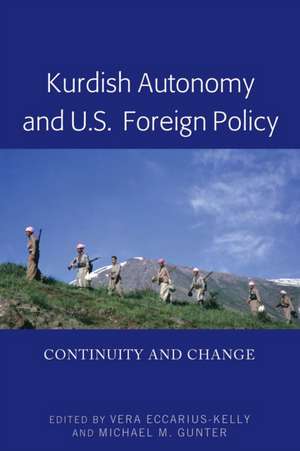Kurdish Autonomy and U.S. Foreign Policy
en Limba Engleză Hardback – 28 noi 2019
Preț: 656.41 lei
Preț vechi: 852.47 lei
-23% Nou
125.62€ • 130.66$ • 103.71£
Carte tipărită la comandă
Livrare economică 12-26 aprilie
Specificații
ISBN-10: 1433168022
Pagini: 252
Dimensiuni: 150 x 225 x 15 mm
Greutate: 0.5 kg
Editura: Peter Lang Copyright AG
Notă biografică
Michael M. Gunter is Professor of Political Science at Tennessee Technological University in Cookeville, Tennessee. He authored ten critically acclaimed scholarly books on the Kurdish question and published dozens of journal articles and book chapters. He is also the Secretary-General of the EU Turkey Civic Commission (EUTCC) in Brussels.
Cuprins
Vera Eccarius-Kelly/Michael M. Gunter: Introduction: Kurdish Autonomy and U.S. Foreign Policy - Marianna Charountaki: Non-State Actors as Agents of Foreign Policy: The Case of Kurdistan - Michael Rubin: Will the United States Ever Support Kurdish Independence? - Thomas Jeffrey Miley/Güney Yildiz: U.S. Foreign Policy Towards the Kurdish Movement Under Obama and Trump - Liam Anderson: U.S. Foreign Policy, Kirkuk, and the Kurds in Postwar Iraq: Business as Usual - Bilal A. Wahab: From Aid to Oil: Iraqi Kurdistan's Dependent Economy - Michael M. Gunter: Trump's Foreign Policy Toward the Kurds - David Romano: The Kurds' Trump Card - Vera Eccarius-Kelly: Kurdish Lobbying and Political Activism in the United States - Haluk Baran Bingöl: From Limited Partnership to Strategic Alliance: The Emerging Significance of Kurdish Para-Diplomacy in U.S. Foreign Policy - Eva Ssavelsberg: "Operation Olive Branch"-Did the U.S. Change Its Strategy Toward the YPG? - Huseyin Rasit: Imperialism, Revolution, and the Desire to Lecture the Kurds: How Should We (Not) Analyze U.S.-Kurdish Relations - Contributors - Index.
